If you’re interested in digestive health, it’s important to understand the regulation of pancreatic secretion. The pancreas plays a crucial role in producing enzymes that help break down food and aid in nutrient absorption. But what regulates the secretion of these digestive enzymes?
In this article, we’ll explore the process of pancreatic secretion, the role of the exocrine pancreas, and the factors that can affect enzyme regulation. We’ll also discuss common disorders that can impact pancreatic function and provide tips for optimizing pancreatic secretion to improve gut health.
Key Takeaways:
- The pancreas plays a crucial role in producing enzymes that aid in digestion and nutrient absorption.
- Regulation of pancreatic secretion is vital for optimal digestive function.
- Factors like diet, stress, and medical conditions can impact the pancreas’s ability to secrete digestive enzymes effectively.
- Disorders like pancreatitis, cystic fibrosis, and pancreatic cancer can have significant impacts on pancreatic function.
- By maintaining a healthy lifestyle and seeking medical advice for any underlying conditions, you can optimize pancreatic secretion and improve gut health.
Understanding Pancreatic Secretion and Digestive Enzymes
If you’ve ever experienced digestive issues, you may have heard that the pancreas plays a crucial role in digestion through its secretion of digestive enzymes. But how does this process work exactly?
The exocrine pancreas is responsible for secreting enzymes that help to break down food in the small intestine. These enzymes include amylase for carbohydrates, lipase for fats, and proteases for proteins. When food enters the small intestine, the pancreas is signaled to release these enzymes through a complex process involving hormones and nerves.
In fact, the pancreas secretes up to 1 liter of pancreatic juice per day, containing a variety of enzymes and other substances.
The pancreatic juice is carried to the small intestine through the pancreatic ducts. Once in the small intestine, the enzymes work to break down the food into smaller particles, allowing for proper nutrient absorption.
Without proper pancreatic function and enzyme secretion, you could experience symptoms such as bloating, gas, and undigested food in your stool.
To sum up, pancreatic secretion and digestive enzymes play a vital role in maintaining proper digestion and nutrient absorption. In the next section, we’ll explore the role of the pancreatic ducts in enzyme regulation.
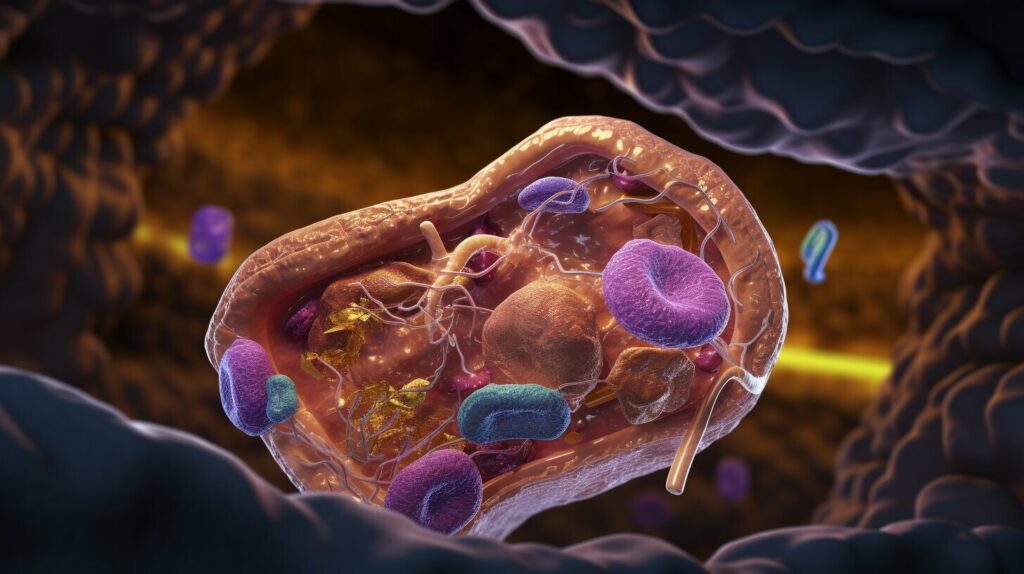
The Role of Pancreatic Ducts in Enzyme Regulation
While the exocrine pancreas is responsible for producing and secreting digestive enzymes, the pancreatic ducts play a crucial role in regulating their release. The ducts transport digestive enzymes from the pancreas to the small intestine, where they aid in the breakdown of food and nutrient absorption.
The pancreatic duct system is made up of two main ducts: the main pancreatic duct and the accessory pancreatic duct. The main pancreatic duct extends through the center of the pancreas and joins the common bile duct before emptying into the small intestine. The accessory duct is smaller and drains directly into the small intestine.
The release of digestive enzymes from the pancreas is tightly regulated to ensure proper digestion. When food enters the small intestine, hormones like secretin and cholecystokinin are released, signaling the pancreas to secrete digestive enzymes. These hormones also stimulate the pancreatic ducts to release bicarbonate, a substance that neutralizes the acidity of stomach acid in order to protect the intestines from damage.
Any obstruction or inflammation in the pancreatic ducts can impede the flow of digestive enzymes and bicarbonate, leading to complications like pancreatitis or pancreatic insufficiency. These conditions can cause a range of symptoms, including abdominal pain, nausea, and malabsorption of nutrients.
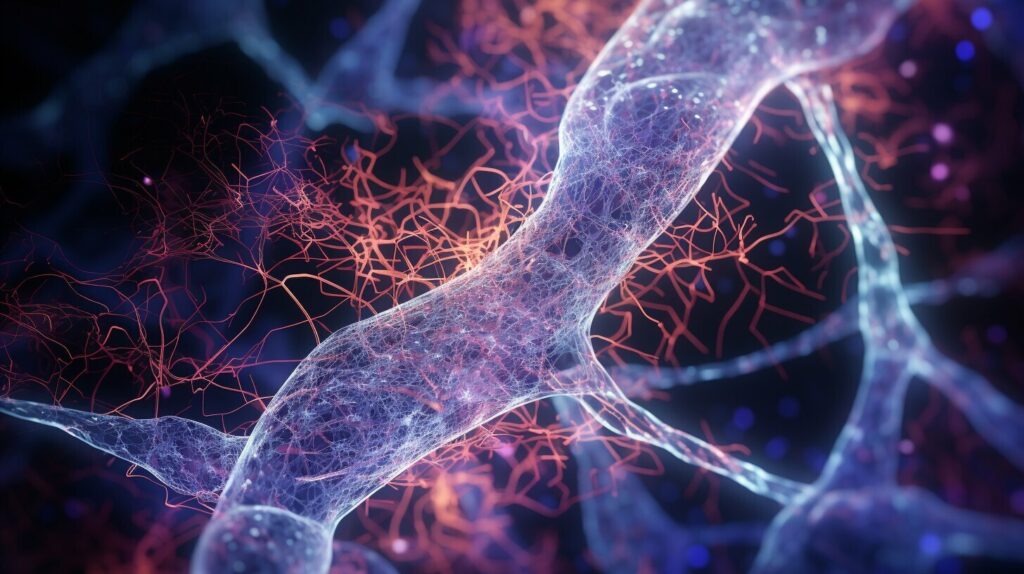
Proper pancreatic duct function is essential for optimal digestive health. If you experience symptoms like abdominal pain, diarrhea, or unintentional weight loss, talk to your healthcare provider to determine if pancreatic duct issues may be a factor.
The Role of Hormonal Signals in Regulating Pancreatic Secretion
Hormonal signals play a crucial role in regulating pancreatic secretion. The two main gastrointestinal hormones responsible for this are secretin and cholecystokinin (CCK). Secretin is released from the duodenum in response to the acidic contents of the stomach, while CCK is released from the intestine in response to the presence of fats and proteins.
When secretin is released into the bloodstream, it stimulates the pancreas to produce and release bicarbonate ions. Bicarbonate ions help neutralize the acidic chyme that enters the small intestine from the stomach. This neutralization is necessary for the digestive enzymes to function optimally.
CCK, on the other hand, stimulates the release of digestive enzymes from the exocrine pancreas. These enzymes include lipase, amylase, and proteases, which are responsible for breaking down fats, carbohydrates, and proteins, respectively.
In addition, CCK also causes the gallbladder to contract and release bile into the small intestine. Bile helps emulsify fats, making it easier for lipase to break them down into smaller molecules for absorption.
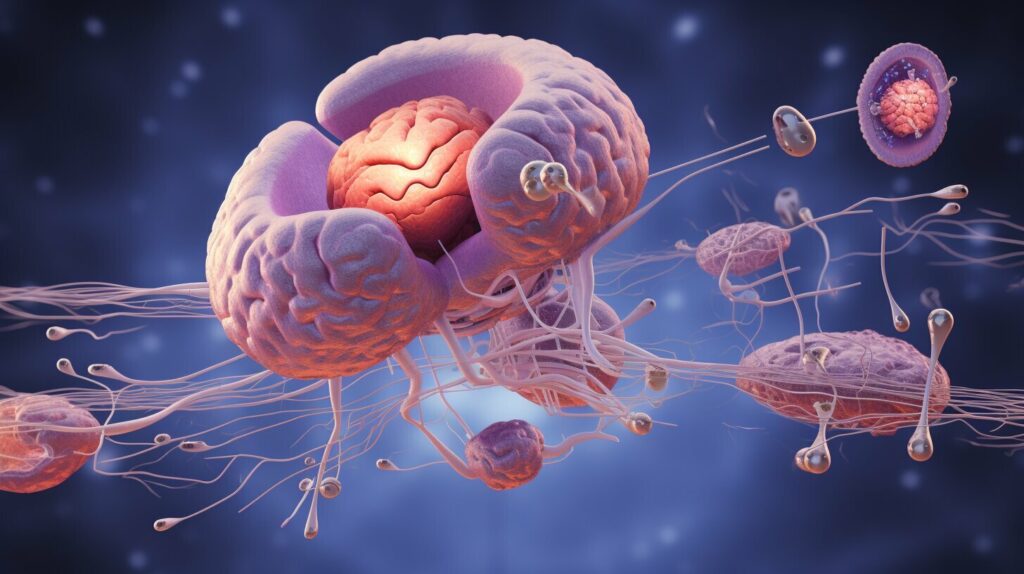
Factors Affecting Pancreatic Secretion
Several factors can impact the ability of the pancreas to secrete digestive enzymes effectively. Here are the most common:
- Diet: A diet high in fat and low in fiber can cause the pancreas to work harder to secrete enzymes, potentially leading to pancreatic stress and inflammation.
- Stress: Chronic stress can impair pancreatic function by altering blood flow and hormone levels.
- Medical conditions: Certain medical conditions like cystic fibrosis, diabetes, and autoimmune disorders can also affect pancreatic function and enzyme regulation.
It’s essential to maintain proper pancreatic function to ensure optimal digestive health. If you’re experiencing symptoms like abdominal pain, bloating, or diarrhea, seek medical advice to identify the underlying cause and prevent any potential complications.
Image source: 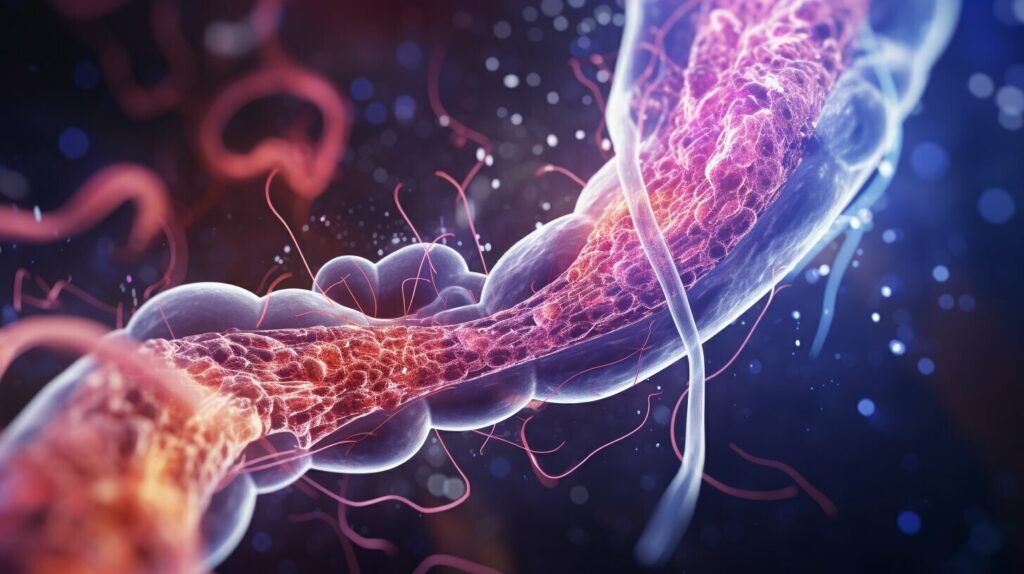
The Importance of Proper Pancreatic Secretion for Digestive Health
Your pancreas plays a crucial role in digestion by secreting digestive enzymes that break down the food you eat. Without proper pancreatic secretion, digestion can be impaired, leading to digestive disorders and nutrient absorption issues.
Conditions that can affect pancreatic secretion include chronic pancreatitis, cystic fibrosis, and pancreatic cancer. Chronic pancreatitis is a condition where the pancreas becomes inflamed and can lead to scarring and damage to the pancreas. Cystic fibrosis is a genetic condition that affects the lungs and digestive system, causing thick, sticky mucus to build up in the pancreas, preventing proper secretion of digestive enzymes. Pancreatic cancer can also affect pancreatic function by interfering with the organ’s ability to produce digestive enzymes.
To optimize pancreatic secretion and digestive enzyme regulation for better gut health, it’s important to maintain a healthy diet with plenty of fiber-rich fruits and vegetables, lean proteins, and healthy fats. Avoid foods that are high in fat, sugar, and processed ingredients, as these can impair digestion and contribute to weight gain.
Stress management is also essential for optimizing pancreatic function. Chronic stress can affect the digestive system by causing inflammation and reducing enzyme secretion. Practicing stress management techniques like meditation, yoga, or regular exercise can help reduce stress and improve overall health.
If you’re experiencing symptoms like abdominal pain, bloating, or diarrhea, consult your healthcare provider for an evaluation. Your provider may recommend diagnostic tests, such as imaging or blood tests, to assess pancreatic function and determine the best course of treatment for your condition.

Remember, proper pancreatic secretion is vital for a healthy digestive system. By maintaining a healthy diet, managing stress, and seeking medical advice when necessary, you can optimize pancreatic function and promote better gut health.
The Role of Pancreatic Secretion and Enzyme Regulation in Digestive Disorders
Disorders that affect the regulation of pancreatic secretion and enzyme production can lead to digestive disorders and nutrient absorption issues. It’s important to understand the potential impact of these disorders and seek appropriate medical attention when necessary.
Pancreatitis
Pancreatitis is a condition where the pancreas becomes inflamed. This inflammation can affect the pancreas’s ability to produce and secrete digestive enzymes properly. Symptoms of pancreatitis include severe abdominal pain, nausea, and vomiting. Treatment typically involves hospitalization, pain management, and dietary changes.
Cystic Fibrosis
Cystic fibrosis is a genetic disorder that affects the body’s production of mucus, sweat, and digestive fluids. It can cause thick, sticky mucus to build up in the pancreas, preventing proper digestion and nutrient absorption. Treatment typically involves a combination of medications, dietary changes, and physical therapy.
Pancreatic Cancer
Pancreatic cancer can affect the pancreas’s ability to produce and secrete digestive enzymes properly. Symptoms of pancreatic cancer include abdominal pain, weight loss, and jaundice. Treatment typically involves surgery, chemotherapy, or radiation therapy.
It’s essential to be aware of the potential impact of disorders like pancreatitis, cystic fibrosis, and pancreatic cancer on pancreatic function and digestive health. If you experience any symptoms of these conditions, seek medical attention promptly.
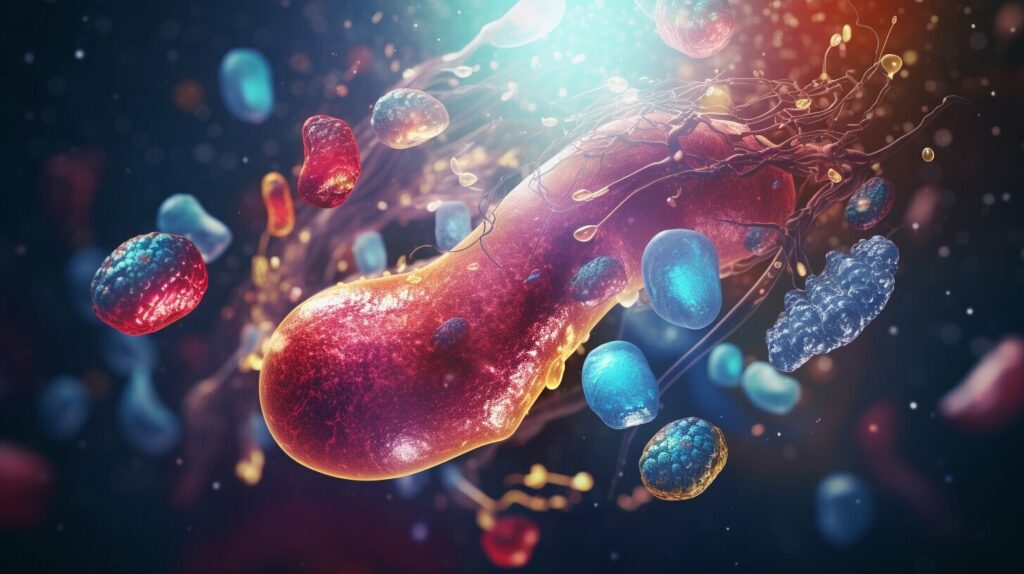
Understanding the factors that affect pancreatic secretion and enzyme regulation can help you maintain proper digestion and nutrient absorption for optimal gut health.
Tips for Optimizing Pancreatic Secretion and Digestive Enzyme Regulation
If you’re looking to improve your digestive health, optimizing pancreatic secretion and enzyme regulation is essential. Here are some tips to help:
- Eat a healthy, balanced diet: Consuming a diet rich in fiber, fruits, and vegetables can help support proper pancreatic function and enzyme secretion. Avoiding processed foods and excessive amounts of unhealthy fats can also improve digestion.
- Stay hydrated: Drinking plenty of water can help keep digestive juices flowing and support pancreatic secretion.
- Manage stress: Chronic stress can impact pancreatic function and enzyme regulation. Incorporating stress-management techniques like meditation and yoga into your routine may help improve digestive health.
- Get regular exercise: Exercise can help stimulate pancreatic enzyme secretion and improve overall digestive health.
- Consult with a healthcare provider: If you have a medical condition that affects pancreatic function or enzyme regulation, work with your healthcare provider to manage the condition and optimize your digestive health.
By taking steps to optimize pancreatic secretion and enzyme regulation, you can improve your digestive health and overall well-being. Remember to consult with a healthcare provider before making any significant changes to your diet or exercise routine.
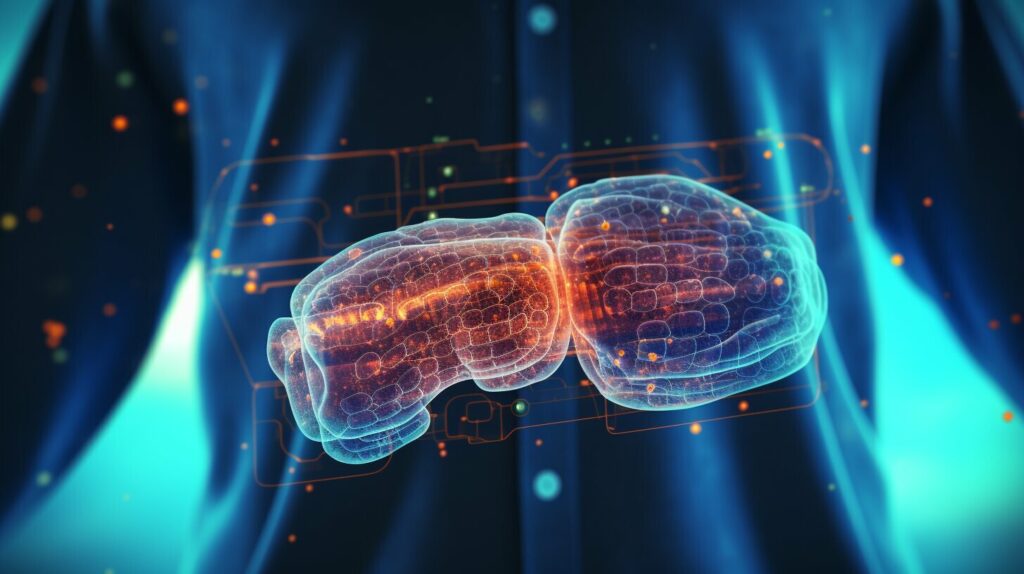
Conclusion
Understanding the regulation of pancreatic secretion is crucial for maintaining proper digestion and overall gut health. The exocrine pancreas plays a vital role in secreting digestive enzymes that aid in the breakdown of food. The pancreatic ducts transport these enzymes to the small intestine for proper digestion. Hormonal signals, such as secretin and cholecystokinin, stimulate the pancreas to release digestive enzymes.
Several factors can affect pancreatic secretion and enzyme regulation, including diet, stress, and certain medical conditions. Impaired pancreatic function can lead to digestive disorders and nutrient absorption issues.
It is essential to optimize pancreatic secretion and digestive enzyme regulation to improve gut health. Maintaining a healthy diet, managing stress, and seeking medical advice for any underlying conditions are practical tips to achieve this.
Takeaway
By understanding the importance of pancreatic secretion and enzyme regulation, you can take steps to optimize your gut health and prevent digestive disorders.
FAQ
Q: What regulates pancreatic secretion of digestive enzymes?
A: Pancreatic secretion of digestive enzymes is regulated by various factors, including hormonal signals, the presence of food in the small intestine, and neural stimulation.
Q: How does the exocrine pancreas function in digestive enzyme regulation?
A: The exocrine pancreas plays a crucial role in digestive enzyme regulation by secreting enzymes that aid in the breakdown of food in the small intestine.
Q: What is the role of pancreatic ducts in enzyme regulation?
A: Pancreatic ducts transport digestive enzymes from the pancreas to the small intestine, ensuring proper digestion.
Q: How are pancreatic secretion and enzyme regulation influenced by hormones?
A: Gastrointestinal hormones, such as secretin and cholecystokinin, stimulate the pancreas to release digestive enzymes and regulate pancreatic secretion.
Q: What factors can affect pancreatic secretion and enzyme regulation?
A: Several factors, including diet, stress, and certain medical conditions, can impact the pancreas’s ability to secrete digestive enzymes effectively.
Q: Why is proper pancreatic secretion important for digestive health?
A: Proper pancreatic secretion is essential for maintaining digestive health as impaired pancreatic function can lead to digestive disorders and nutrient absorption issues.
Q: What are some common disorders affecting pancreatic secretion and enzyme regulation?
A: Disorders such as pancreatitis, cystic fibrosis, and pancreatic cancer can significantly impact pancreatic secretion and enzyme regulation.
Q: What are some tips for optimizing pancreatic secretion and digestive enzyme regulation?
A: To optimize pancreatic secretion and digestive enzyme regulation, it is recommended to maintain a healthy diet, manage stress levels, and seek medical advice for any underlying conditions.














